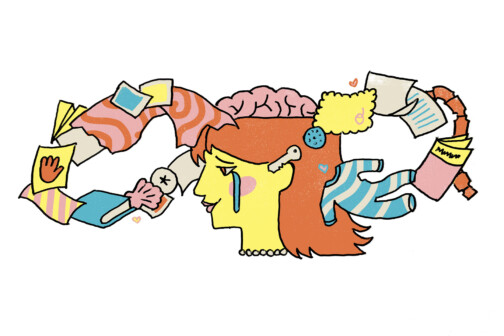IT’S WELL understood that we in Dallas stand in a long tradition of practical people. Scrappy, savvy, shrewd, we know – have always known -to expect the worst of nature. Ours has never been a nurturing landscape of the sort that breeds poets, transcendentalists or law scholars. It was not for nothing that a Methodist minister in Dallas -long dead now and lovingly remembered by his flock – titled one of his sermons “God Our Banker.”
He knew his congregation well. It was often the banker who made life possible for those restless spirits among us who risked everything to plant cotton, drill for oil or build a warehouse. When things went well, we put out azaleas, then watered and waited and worked to achieve one month of indescribable beauty. But we knew that our natural habitat was mes-quite and scrub cedar, and we never forgot Lyndon Johnson’s dictum: “Cast your bread upon the waters and the sharks’ll eat it.”
We’re a wary people, but there’s something inside us that seems ready now to respond to a gentler stimulus that might arouse in us needs we barely knew were there. Today, rarified energies all over Dallas are seeking new ways to express themselves. Two of the most interesting aggregations can be found at the Dallas Institute for Humanities and Culture, a foundation that speaks directly and creatively to city problems, and at the Isthmus Institute, where you’ll find an unlikely yet compelling collaboration between science (represented by the Department of Psychiatry at the University of Texas Health Science Center) and religion (spoken for by the SMU School of Theology).
First, the Dallas Institute for Humanities and Culture. This seminal group holds forth in a handsome house on Routh Street. The institute was founded almost two years ago by Gail Thomas in collaboration with Louise and Don Cowan, Joanne Stroud and others who had played key roles in building the University of Dallas. With course offerings, lectures and seminars, they’ve created a community of people who want to experience a vital connection with their own time and place. The institute also has developed an agenda for Dallas; it’s achieving impressive results.
By bringing Dr. Mortimer Adler, the eminent educator, to town on several occasions and repeatedly exposing his ideas to people interested in the public schools, leaders of the institute have persuaded DISD Superintendent Linus Wright to try a pilot program at the Lincoln Humanities/Communications Magnet, incorporating Adler’s proposal.
According to the Adler plan, every child would be offered a classical education, stressing language and literature, the fine arts, mathematics, natural science, history, geography and social studies. Each student would be coached in reading, writing, speaking, calculating and the exercising of critical judgment, and would be introduced to great books such as the U.S. Constitution. They would also participate in active discussion of ideas and values.
VOCATIONAL EDUCATION ISN’T ENOUGH
Central to Adler’s proposal is the admonition that subjects such as Laundry and Dry Cleaning I and II, Building and Grounds Maintenance I and II, Plumbing and Piping Trades I and II (all currently listed in the DISD catalog) must be dropped to gain enough time for the core curriculum.
It won’t be easy. Vocational education dies hard. Many of us remember former Secretary of HEW John Gardner’s line from the late Sixties that if we don’t honor the effort of the plumber the same way we honor the work of the philosopher, “neither our pipes nor our theories will hold water.” Quite true. But Adler is arguing that a plumber can best be trained on the job after learning to read, write and think in basic schooling.
Writer/analyst John Naisbitt has pointed out that the reforms brought to our schools during the Seventies produced a generation of Americans less well-educated than their parents, something previously unheard of in our history. It’s time to turn that trend around. Adler’s program holds much promise if we’ll follow it through to the university level and abolish schools of education. Our teachers, he insists, need degrees (not teachers’ certificates) in English, history and real disciplines.
Adler’s ideas are currently being tested in some major cities including Atlanta, Chicago and Cleveland. Hooray for the Dallas Institute and Dr. Juan Flores, DISD director of magnet schools, for bringing them to Dallas. Let’s hope they become part of the debate in April’s school board election.
SCIENCE AND RELIGION CAN GET TOGETHER
The Isthmus Institute is more difficult to describe, dealing as it does with ultimate reality. Few of us have thought muchabout these things since college when weclosed the books on Problems of ReligiousThought. Now the institute is bringingNobel Prize-winners to Dallas-peoplewho are bridging the gap between religionand science, who talk of physics with theinsight of poets. These distinguishedspeakers are attracting 900 people to theirlectures in the Medical School’s GoochAuditorium. The next speaker is Sir JohnEccles, a 1963 Nobel Prize recipient inmedical neurophysiology, on January 29.
With Dr. James Hall at the helm, Isthmus is clarifying some of the scientificconcepts that inform our ideas and enlivenour language. Sometimes we don’t understand the terms we’re using. Equilibrium,for example, has been believed by many tobe desirable – a sign of balance and health.Not so. According to current thought inphysics, equilibrium means random, incoherent dispersal of energy and eventualdeath. Disequilibrium, with particles always in motion and constantly reorganizing themselves at higher levels of complexity, means life, possibility and hope-foraspecies, a city or an individual. What morecould we ask for the new year?
Get our weekly recap
Brings new meaning to the phrase Sunday Funday. No spam, ever.
Related Articles

Local News
Bill Hutchinson Pleads Guilty to Misdemeanor Sex Crime
The Dallas real estate fun-guy will serve time under home confinement and have to register as a sex offender.
By Tim Rogers

Restaurants & Bars
The Best Japanese Restaurants in Dallas
The quality and availability of Japanese cuisine in Dallas-Fort Worth has come a long way since the 1990s.
By Nataly Keomoungkhoun and Brian Reinhart

Home & Garden
One Editor’s Musings on Love and Letting Go (Of Stuff, That Is)
Memories are fickle. Stuff is forever. Space is limited.
By Jessica Otte


